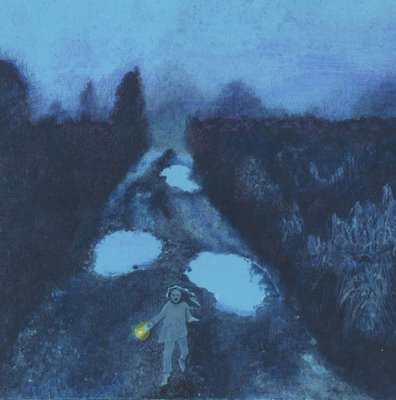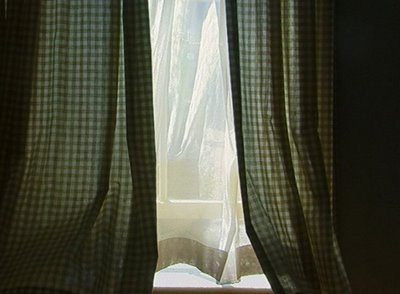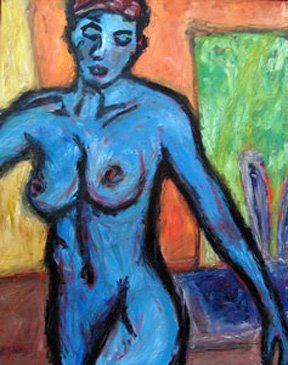Wheels of the Chariot

The same confusion in outlines which exists in our own Bogie and Hobgoblin gives the Bwbacha double character, as a household fairy and a terrifying phantom.In both aspects it is ludicrous, but in the latter it has dangerous practices. To get into its clutches under certain circumstances is no trifling matter, for it has the power of whisking people off through the air. Its services are brought into requisition by this purpose by troubled ghosts who cannot sleep on account of hidden treasure they want removed, and if they cannot succeed in getting a mortal to help them in removing treasure, they employ the Bwbach to transport the mortal through the air.
— Wirt Sikes, British Goblins (1888)
WHEELS OF THE CHARIOT
At length the duple one
descended to the
badlands of my balls,
Can and Able, Helter
Skelter, Blissful Abyss,
blue skies swaying
twixt two thighs of
ancient ice:
They swing
from my day’s peramble
hooting and hymning
the hardons of God,
rewounding & redeeming
& rescinding heavne’s sense
with a sensual
devou t all cock and
and grinding clout,
crowing pink verbotens
furrowed through the
world’s foundations
too far and wide below.
Left and lefter knight
don hairy hefty
helmets to shout
and joust in their
shared scrotum for
the hero’s portion
of the maid, each
ready to plunge
his staff straight through
the heart of God
to pick the locks
of her fast girdle.
And me a married man,
trothed to higher
orders & faithful
to one woman at
the exclusion of all
they seek, those
surly burly balls,
clackering loud
in riotous thrall
the lewd rapacious
pudendas of
the best wrongs
in the hood. And
yet without their brassy
bright bravados
I’m just a flat ass
on a white chair
writing down tatters
of silkie underwear
strewn by your
old conquest of
a dry and aging shore.
Lack of pussy
make you brave
said Eddie Murphy
from his cross;
They bear the
sacred brunt
of all the cunts I
fucked, slapping on
so many heaving
rears as I plunged to
hilt in slishy undine
echoes — They juiced
my next joy’s salvo
of halcyon clouds
and rain. My thought
is half housed on
their half shells,
more Yours than
I can say in any
watery-enough
full-hearted way.
The poem bears witness
to my ancient
vassalage to balls:
See? I’m kneeling
in pure reverence
to smooth stones
of the sea swinging
blue and surly
like to hot colts
at the gate, like eyes
of the lion of God
staring out (or back?)
in the dark, like
St. Michaels
demented older
brother, that rude
hallower by which
all seams are cemented.
An infernal metronome
is tocking ear to ear
inside my skull
of delight’s thwocking
brute disorder,
night and blicker
with a jones for
jissoming a pair
of milky sweet
swole knockers,
ferrying the bass
notes lowest in
the surf’s bad crash.
In that undying blue
blue rhythmus
of left and lefter
thrall I glint
and thrash and grin
the rictus of the
moon and groan
hot heaven up
from waters
like the sun
fertilizing the
world with golden light
— purity inside
hard orbs of
vicious sight.

FIRE SPRITE FLA.
2004
Indeed some fire-sprite may
be at work, spawn of every sun
which aches to rise and
languish above the Western
gulf, refusing to go down.
He darts across the state
igniting the souls of pine
& subdivisions & sleeping lakes
like paper boats then
dances round their flame.
Out on the beaches the
young worship him, sprawled
on towels & hip-hop smashing
from car radios. Browning
in his orisons. In the bars
the dactyls serve his ire,
pouring out fistfulls
of gasoline while on the
TV brightly-colored street
cars go round and round
and round in a calyx of
white-hot speed.
The alligators feel him in their
gut edging from perch to shore
to raven on poodles and
the noggins of boys
too foolish not to dive in.
And the eyes of crazed
suburban mothers
kilned in debt and misery
are hottest in him,
their irises like fangs
as they cooly scan
sons and daughters crying
everywhere. What hour
of my summer day
is not some precipice of him,
an invitation in the brilliant
door to strip raw the hungry
hymn and glut on pipes of fire.
His cartel’s more potent than
every pulpit in the state
which crows brimstone taboos,
the one eternal in its fires,
the other right here right now
in purest puerile pyre,
merry and malicious
and so in infernally salacious.
Bask and dream in it if you will,
backyard Sunday snoozer:
He’s whispering to those
basking cells on tits and
nose to rise and riot
while you drowse.
Your heart on his
barbie, his fork in
your meat of carouse.

THE DOGS
2002
At first, the dogs were scalding,
furious, and free. I chased them nightly
out the walled defenses of my frigid self,
aswirl in humid fists of orchid and musk,
thrilled with the chase toward wantons
revealed only at the latest, nigh-drunk hour.
How the dogs all bayed canine joy!
But as the years progressed
the dogs grew hoary, lupine, hungry, mean.
I no longer followed them: they chased me
again and again out of my sad door,
yapping their saws at my sorry ass
out into the ever-more sterile
boneyard woods of bitter night. The sweet
odor of sex descended to some worse, a
whalish odure; no bandage was big enough
for the wound whose pus I was.
Beds now wronged a wrong I knew too well
yet found impossible to resist: a toothy
will now pawed my thirst, each night a hood
my executioner smiled so patiently from,
a cunning, baffling, so powerful wolf
drinking me down the last gnawed bone.
BALL BLUES
1995
1.
The red numerals
of the clock burn in
the night like coals.
It is 12:30, it is 1:12,
it is 2:03, it is 2:50,
it is 3:19, it is 4:10.
Each slice of hour
cuts into me most sharply
where I least have you.
My balls glow an angry
blue tonight, lunar
angels of your absence.
My cock strains to free
itself from my hips, a
stone viper hunting your silence.
I won’t jack the cream tonight.
I keep it for you even
though you will not save
your honey for me.
Tonight I refuse to admit
solitude’s wadded Kleenex.
My blue balls defy God,
they are lungs bursting
leagues beneath the sea.
They will not rise
unless you call them.
Speak or drown me in foam.
2.
You looked at me too
deeply today. Now my
balls are blue with your eyes.
They are overripe plums,
purple wineskins bursting
with torch brandy.
Run your tongue slowly
over that thick udder,
taste the taut fury
of my scrotum. Pull your
fist up the ladder
of my leaping cock and
feel the veins pumping
like the heart of horse
galloping moonlit ridges.
Suck the ruddy mile
of this heat rising
from the roots of my
loneliness to the slick
blue skullcap of my love
for you: all of that
waits for you this night,
waking me again and again.
And at the summit
of that impatient hammer
there’s a blind eye searching
the heavens for your pussy,
there’s a parched mouth
gaping for your peach honey,
there is an angry cock head
wild with thoughts of you.
I am one lurch from gushing
pure devil brimstone
all over your breasts, your
ass, your eyes, your hair.
My longing is a terrible angel
trapped tonight in a web
of hornets and honeysuckle,
bulging and throbbing
and lunging at the
spinning night, aching
to jam my swollen heart
up and up and up the wet
furrow of your absence,
cry your name, and die.
Tell me this is not
the cruelest love of all.

GOD’S BALLS
2000
Are like eyes of
blue fire
and lightning
everywhere: Eve
of destruction
on her bed
her white thighs
opening to receive
me. No one may
live in this red
seam between
the fin and foam.
Some frenzies
invoke, others
provoke. Naked
and screaming,
I enter
MAN POEM
2002
No man can conscience
or even connive
writing a poem
about a Man’s Experience—
it’s assumed we have
a prior right which
banishes all current
title to such talk:
We just do, and in
so doing are dismissed
for dingdongy wrongy ways:
I never think to
criticize women
for how they’ve failed
yearnings which,
being male, are suspect.
Certainly I’d never
vault and vaunt them
in a poem, because
I know such priapal bronzings
are unconscionable,
at least unpublishable.
I’m supposed to save
such rants for the
drum banging congress
of beer-drinking boors
playing paintball
out in confederate sticks.
So I go with the flow
and save my pecker-rants
for road and wood.
No one cares to hear
how disappointing this thing
desire is, so hot for a woman
in ways a woman hardly cares for,
but rather serves and fawns
to keep a man hearth-side.
How sad it is that
so much gets lost in translation,
the juicy central fact of sex
too central for a woman,
whose tastes seem to run
toward food and babies and talk,
effects not causes, circling
the boat rather than
going balls to the walls.
Sad how a man has to
swear off so much of
his homeland manners
to share a house with a woman.
What’s the point of this?
It’s convict-talk,
tappings on a cell wall
incoherent to the woman
who yearns for something
else from me. Why bother
proving I’m just a man? It’s assumed.

BALLS
2002
The greatest things I’ve cared to do
I couldn’t for lack of balls.
Standing at the arch
of something bold and real
sharp with the salt whiff
of an unsponsored fling,
I wimped out, returning a halved man
to safe and known, less scathing pursuits.
I left my own Christian God
behind but could not fission
the emptiness into a new divine
spark. And so sanctified mere hunger.
Couldn’t hold on to that guitar
savagely enough to hack away
the useless ties of love and fame.
Sober for a while, I couldn’t leave
it behind, and so spoiled every
next drink I tried. I left my wife
but couldn’t fuck like a yahoo
due to remorse and a useless conscience.
In every way I’ve failed as a passionate
man, seeing what I could be
and then, biting my nails, returned
to what I simply was. Told to shit
or get off the pot, I lumbered away,
sorry to have even tried. Cronos had
the balls to sickle his father’s off,
making him the Dude of Time.
Having failed myself, I became
time’s motleyed food, a plate of
steaming huevos rancheros fresh
clipped from the bull who stood
at his real life and couldn’t,
each I can’t a clangorous snip.
I became a map bordered by all
I wouldn’t, a safe land, perhaps,
certainly one fit for marriage and
sobriety and long slow accomplishment.
Where might I be had I more balls?
Surely a bright clangorous place of
bronze and steel blades, piled high
with trophies, notched belts, prizes
and booty, the long stain of burnt
bridges and homes with no way
to look back. Having become the
Knight of Time, ceaseless, unburdened,
up to the knees in blood and lime.
HELL’S BELLS
2004
Tunstall Church (in Norfolk),
(was) destroyed by a fire,
which yet left the bells uninjured;
the parson and churchwardens
quarreled for possession of them,
and meantime the Old Gentleman
watched his opportunity and
walked off with them. He was,
however, found out and pursued
by the parson, who began to
exorcise him in Latin. So in his
hurry he made his way through
the earth to his abode, taking his
booty with him. The spot where he
disappeared is now a boggy pool
of water, called Hell Hole, on the
surface of which, in summer-time,
bubbles are constantly appearing.
These, the folks say, are caused
by the continual sinking of the
bells through the water on their
endless journey to the
bottomless pit.
— Robert Charles Hope, The Legendary
Lore of the Holy Wells of England
... It was a pit — with fathoms under it —
It’s circuit just the same.
Seed—summer—tomb—
Whose Doom to whom?
— Emily Dickinson
The next poem’s begun:
so the bells hath rung
deeper in the mere
where nothing is cear,
nothing surely known
but that bubbles of bone
are rising from within.
Call it my old sin
to hurl high bells
down a dark missal
where ship-mast and whale
finish one tale’s
door into this other
further down my mother’s
horror, my father’s delight.
Endless the swirling flight
down a dark cold well
this singing bell;
endless its weird chime
inside the next rhyme,
the next rappelling poem.
Sound to the ankle-bone
of that first man
encrypted where he stands
down in the footers
of the blue headers
of a fish-god’s roof:
these bubbles are proof
those bells never cease
tolling the silver crease
between now and forever:
And thus I endeavor
as long as my pen troubles
to ink those wild bubbles
singing up from way down.
Who know what God found
under his own spire:
old bones, swords on fire,
and the Word, first and last,
where every bell was and is cast.
CAPE BLUE BALLS
2005
O nymph, loveliest of all the ocean,
though my existence gave you no joy,
what did it cost you to beguile me
with mountain, cloud, dream or void?
— Adamastor, titan-spirit of the Cape
of Good Hope in Camoes’ The Lusiads
Love drew You here — OK, desire,
that full ache of wave in gale,
a blueballed bull frenzy which cannot
think of higher things till the lower
ones get done, bull balls to walls
of salty hoochacha, thighs
flung like shores of a roaring
deep-contessa sea. A woman I was
dating tentatively after my first
marriage smiled when I at last
proposed that we make love;
you mean you want to fuck me,
she said with an evilly
complicit sigh, and the whole
space we’d built shifted and
went tumbling down the red maw
of the wave which hurled itself again
and again and again between us
the lovers become the cry of surf
relentless on wild shores. We both
wanted it bad that hot summer
of hurled storms, but what that
was could not be slaked with what
our sexes marshalled to the task
— cock in cunt, tongue to clit
or slathering sperm foam,
teeth nailing sharp desire
to screamed nipples, balls drumming
on asscheeks, no: None
of those red permutations would
equate, and that was where I
found You, my yowling Cape,
the awe in every awesome clinch
augmenting every futile Yes!
my love and I kept shouting
at each other as we teased the
fragrant sprite from each others’
loins. You never recovered from
the lust which betrayed You
to rock and shore and storms
to nth infernity; here at this
quietest hour, love and age
distill me to I yet war on
with dry eternity, choosing
still to roger on, the old sea-bull
between my knees, his horns
ramming toward the pure
puerile wilderness of swelter,
panties dangling from the lees.
Desire drew You here, but
love if that hard ache is what
is loudest on this page
and is the bawling rage
of every angel jism to
splash the harrows of Your Cape.
Here where nothing ever quite
gets done will nothing else quite do.
Red in royal amplitude
and every a smiling blue.













